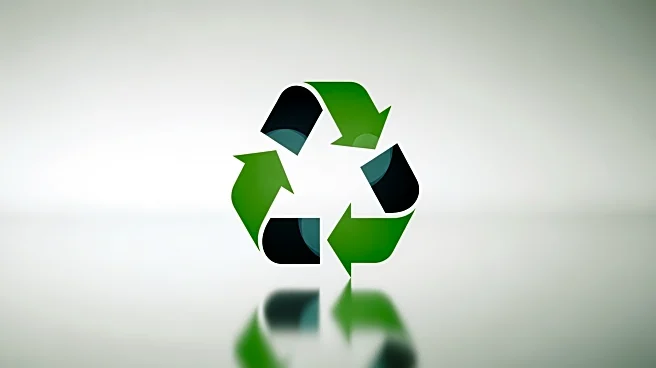What's Happening?
The fashion industry is increasingly adopting recycling as a key strategy to address its environmental impact. Historically, the industry has been criticized for overproduction and waste, contributing
significantly to pollution. In response, brands are investing in recycling initiatives to manage textile waste, reduce dependence on virgin resources, and meet consumer demand for transparency. Notable programs include H&M's Garment Collecting, Levi's Buy Back, and Patagonia's Worn Wear, which encourage customers to return garments for recycling or resale. These efforts are driven by consumer demand, particularly from Millennials and Gen Z, who prioritize sustainability in their purchasing decisions. Regulatory measures, such as the European Union's Circular Economy Action Plan, are also pushing brands to redesign products and supply chains to be more sustainable.
Why It's Important?
The shift towards recycling in the fashion industry is significant as it addresses multiple challenges, including resource scarcity and regulatory compliance. By reducing reliance on virgin materials, brands can stabilize their supply chains and align production with environmental goals. This transition is crucial as the industry faces increasing pressure from consumers and governments to adopt sustainable practices. Recycling initiatives not only help brands meet these demands but also enhance their reputation and investor confidence by strengthening their Environmental, Social, and Governance (ESG) credentials. As the global textile recycling market grows, it presents new business opportunities, such as upcycling, resale, and rental, which can generate revenue while reducing environmental impact.
What's Next?
The fashion industry is moving towards a circular model where recycling is integral. Advances in technology, such as AI sorting and biotechnological fiber regeneration, promise to accelerate this transition. Brands are expected to continue investing in closed-loop production systems, where old garments are broken down and re-spun into new textiles. Additionally, resale and rental platforms are likely to expand, reducing waste and creating recurring revenue streams. As recycling becomes a cornerstone of brand identity, companies will need to offer visible proof of responsibility to differentiate themselves in a crowded marketplace.
Beyond the Headlines
The adoption of recycling in the fashion industry has deeper implications, including ethical and cultural shifts. As consumers increasingly view fashion as a statement of values, products made from recycled materials allow them to express environmental awareness. This trend reflects a broader cultural movement towards sustainability and responsibility. Furthermore, the industry's embrace of recycling could lead to long-term shifts in production practices, with brands prioritizing transparency and accountability across the value chain.









